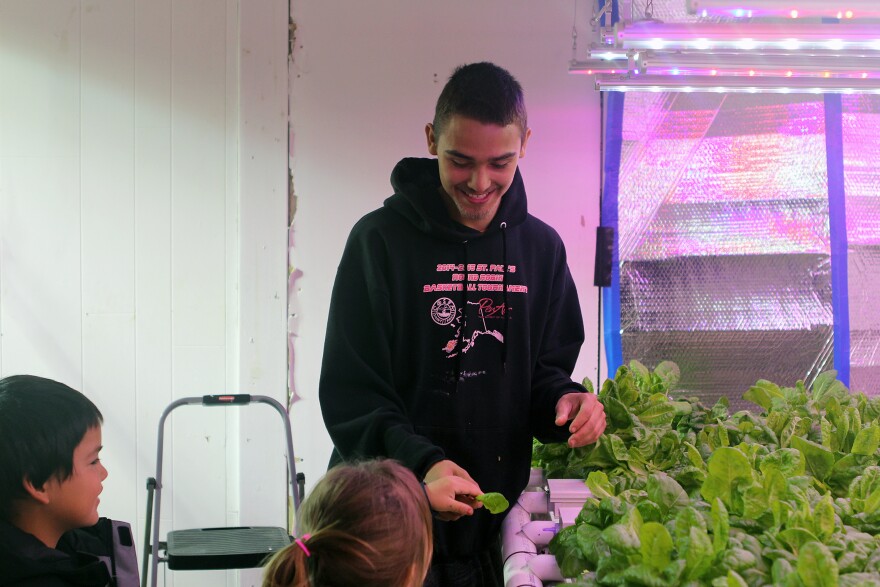The Pribilof Islands in the Bering Sea are a magnet for scientists who come to study everything from fur seals to migratory birds. When they leave, that research often leaves with them.
But for the last nine years, the local tribe has found a way to bring it back home. Each fall, a group of scientists return — not to do research, but to share its findings with the students of Saint Paul and Saint George Islands.
For the first time this year, a former student is now a teacher.
Nineteen-year-old Dallas Roberts is in Saint Paul’s greenhouse. It’s a couple of rooms in the basement of the island’s grocery store, lined with trays of plants under bright red and blue lights. He’s surrounded by a gaggle of second and third graders.
Roberts is teaching them how a greenhouse works. It’s part of Bering Sea Days. Since 2008, the Pribilof School District has blown out a week of classes to focus on science from the region.
Roberts grew up in Saint Paul. He graduated from the high school last year, and he has fond memories of going through Bering Sea Days as a student.
“I thought it was a blast throughout my whole high school career,” said Roberts. “I think we were all excited to get out of school work for a week.”
Roberts has worked for the local tribe — the Aleut Community of St. Paul Island — since high school. After a year of college, he decided to come back.
“I don’t see myself doing anything different right now,” he said. “I mean the greenhouse is a part of me that I can’t easily give up.”
That’s what Aquilina Lestenkof likes to hear. Lestenkof helped create the program. She hoped to get more kids interested in working in environmental fields on behalf of the community. Creating teachers like Roberts is ultimately her biggest goal.
“When you build people that can speak about environment, that’s one thing,” said Lestenkof. “When you build people who can teach about the environment, that’s a whole other ball game.”
As a teacher, Roberts joins scientists from across the country. Program organizer Lauren Divine says Bering Sea Days exposes kids to things they would never learn in a traditional classroom — like rearticulating baby orca skeletons or the chemistry of sea ice — and connects students to their changing environment.
“People are coming in who have studied something specific to St. Paul, Alaska, the Bering Sea, or the Arctic,” said Divine. “Even though the students are in a region where they can see climate change happening, it’s not something they would be exposed to in a traditional science setting.”
The goal is to make sure that some of the research happening in the Pribilofs is shared with the people who live there — maybe even inspiring the next generation of scientists.
When Roberts decided to come back to the community, he worked out a deal with Divine: If he took online classes, he could work for the tribe’s Environmental Conservation Office.
He says Bering Sea Days applies science to daily island life, like the annual fur seal harvest.
“I grew up doing the seal harvest,” he said. “So learning a different side — not just harvesting them, but learning about their whole body — it’s important for our community to know what the seals eat and how certain climates affect them. Because right now, they’re declining, and I think that hurts us.”
He never imagined that he’d be back as a teacher, but now that’s his favorite part.
“It was amazing to teach younger kids about the greenhouse,” he said. “Even if I didn’t know all the answers, I answered them to the best of what I know.”
And he’s keeping an eye out for students who might follow his footsteps and become teachers themselves.







